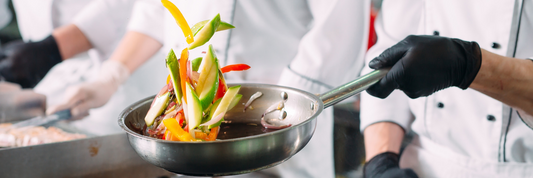The food truck industry has exploded in popularity over the past decade, offering a unique and flexible business model for aspiring chefs and entrepreneurs. The article below provides a comprehensive overview of what it takes to open a food truck, from the initial research to marketing your business, and covers the pros and cons, costs, and food safety considerations.
- What Is the Hospitality Industry? Different Sectors of the Hospitality Industry
- Guideline to Create the Perfect & Profitable Bar Food Menu
- What is Mise En Place? Benefits of Mise en Place? Mise en Place Steps
- What is a Concierge? What Does a Concierge Do? How to Become a Concierge
What is a Food Truck?
A food truck is a mobile kitchen that serves food and beverages. These vehicles are equipped with cooking appliances, refrigeration, and storage to prepare and serve meals on the go. Food trucks offer a wide range of cuisines and can be found at festivals, events, street corners, and various locations. They provide a flexible and cost-effective alternative to traditional brick-and-mortar restaurants, allowing entrepreneurs to bring their culinary creations directly to customers.

Are Food Trucks Profitable?
Food trucks can be highly profitable, but their success depends on various factors:
-
Location: Operating in high-traffic areas with significant footfall, such as business districts, events, festivals, and popular tourist spots, can drive sales and increase profitability.
-
Concept and Menu: Offering a unique, high-quality menu that stands out from competitors can attract a loyal customer base. Menu items should have a good balance of cost and pricing to maximize profit margins.
-
Operating Costs: Managing costs effectively is crucial. This includes the cost of the truck, equipment, ingredients, permits, and maintenance. Keeping overhead low compared to traditional restaurants can lead to higher profit margins.
-
Marketing: Effective marketing, including social media, local advertising, and participation in events, can significantly boost visibility and sales.
-
Adaptability: The ability to move to different locations based on demand and events can help food trucks maximize their revenue potential.
How to Start a Food Truck
Research Your Food Truck Scene
Before diving in, research the local food truck scene. Understand the market demand, popular cuisines, peak operating hours, and potential competition. This will help you identify opportunities and avoid oversaturated areas.
Choose a Food Truck Concept
Select a unique and appealing concept for your food truck. Consider your culinary skills, target audience, and current market trends. Your concept should stand out and offer something different from existing food trucks.
From that, you can choose a name and logo that properly reflect the heart of your business. Your concept, name, and logo should exhibit the following attributes:
- Be unique and memorable
- Be descriptive and attention-grabbing
- Clearly express your intentions without being too specific so that it can allow for growth

Write a Food Truck Business Plan
A solid business plan is essential. It should outline your business goals, target market, menu, pricing strategy, marketing plan, and financial projections. This document will also be crucial when seeking funding from investors or lenders.
Get Funding for Your Food Truck
Securing funding is often one of the biggest challenges. Explore various options, including personal savings, bank loans, investors, or crowdfunding. Be prepared to present a detailed business plan and financial projections to potential lenders or investors.
Get Food Truck Licenses and Permits
It is vital to inquire about the requirements from your local authority, such as the Department of Motor Vehicles (DMV) office, the Chamber of Commerce, and the Health Department, as food truck permits and licenses can differ from state to state and even city to city.
Many of the same licenses and permits needed for restaurant businesses also apply to opening a food truck:
- Business License
- Employer Identification Number
- Food Service License
- Employee Health Permit
Additionally, you will most likely need the following food truck specific permits:
- Mobile Food Facility Permit
- Zoning and Parking Permit
Buy a Food Truck
Purchasing a food truck is a significant investment. You can buy a new or used truck, or even convert a van or trailer. Ensure the vehicle is in good condition, meets health and safety standards, and can be customized to fit your kitchen equipment.
Purchase Your Food Truck Equipment and Supplies
Equip your food truck with the necessary kitchen appliances, utensils, and supplies.
- Cooking Equipment: Grills, ranges, fryers, microwaves, toasters
- Warming and Holding Equipment: Countertop food warmers, soup kettles, fry dump stations
- Food Prep Equipment: Work tables, chef knives, cutting boards, cookware, kitchen utensils, kitchen thermometers, serving and portion spoons
- Serving Equipment: Disposable take-out supplies, food trays, napkins, cups, plastic cutlery
- Refrigeration Equipment: Prep tables, under-counter refrigeration, ice machines
- Janitorial Equipment: Handsinks, compartment sinks, floor mats, sanitizing chemicals, trash cans, recycling bins, floorcare products
Choose a POS System
Point of Sale (POS) system allows you to take credit card payments directly from your truck but may require internet access.
Many food trucks decide to only accept cash in order to avoid relying on internet access; nevertheless, since customers are less likely to carry cash, this may reduce the number of people who visit your business. Food truck owners are choosing POS systems that let them take credit cards in addition to cash as a result of this.
Invest in Food Truck Marketing and Advertising
Promote your food truck through social media, a professional website, and local advertising. Consider attending food truck festivals, partnering with local businesses, and offering promotions to attract customers. Building a strong online presence is crucial in today’s digital age.
Here are just some food truck marketing ideas:
- Make sure people can clearly see your striking logo. Put it online, on flyers, and on your truck.
- Create a striking menu board. Make sure your menu board is readable, visually appealing, and effectively presents your food.
- Make a website with images, an "About Our Company" section, and your regular locations.
- Establish social media profiles so that clients can communicate with your company, view photos, and receive event notifications.
- Choose distinctive sites for your food truck.
Pros and Cons of Opening a Food Truck
Advantages of Opening a Food Truck
- Lower Startup Costs: Compared to opening a traditional restaurant, food trucks have lower initial costs.
- Flexibility: Food trucks can move to different locations, allowing you to reach a broader customer base.
- Creative Freedom: You can experiment with different menus and concepts without the constraints of a brick-and-mortar location.
Challenges of Opening a Food Truck
- Regulatory Hurdles: Navigating the various licenses and permits required can be challenging and time-consuming.
- Weather Dependence: Bad weather can significantly impact your business, reducing customer turnout.
- Maintenance Costs: Maintaining the truck and equipment can be costly and requires regular attention.
How Much Does It Cost to Start a Food Truck?
The cost of starting a food truck varies widely based on factors like location, truck condition, and equipment needs. On average, startup costs range from $50,000 to $200,000. This includes the cost of the truck, equipment, licenses, permits, and initial inventory.
What Licenses Do You Need to Start a Food Truck?
Common licenses and permits required to start a food truck include:
- Business License
- Employer Identification Number
- Food Service License
- Employee Health Permit
- Mobile Food Facility Permit
- Zoning and Parking Permit

Food Safety Considerations for Food Trucks
Food safety is paramount in the food truck business. Ensure your truck meets health and safety regulations, including proper food storage, preparation, and sanitation practices. Regularly clean and sanitize all equipment and surfaces, and train your staff on food safety protocols.
Conclusion
Opening a food truck can be a rewarding venture with the right planning and execution. By understanding the market, securing proper funding, adhering to regulations, and investing in marketing, you can build a successful food truck business. While there are challenges, the flexibility and creative opportunities make it an attractive option for many aspiring entrepreneurs.







